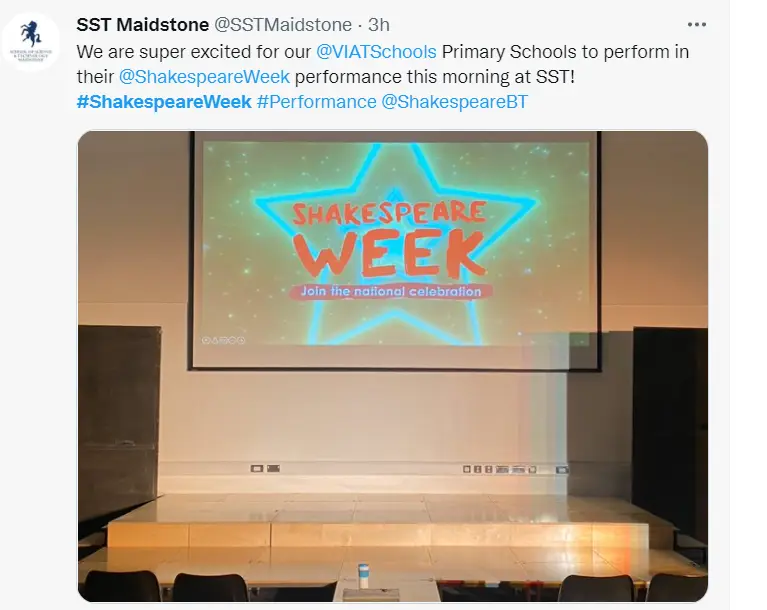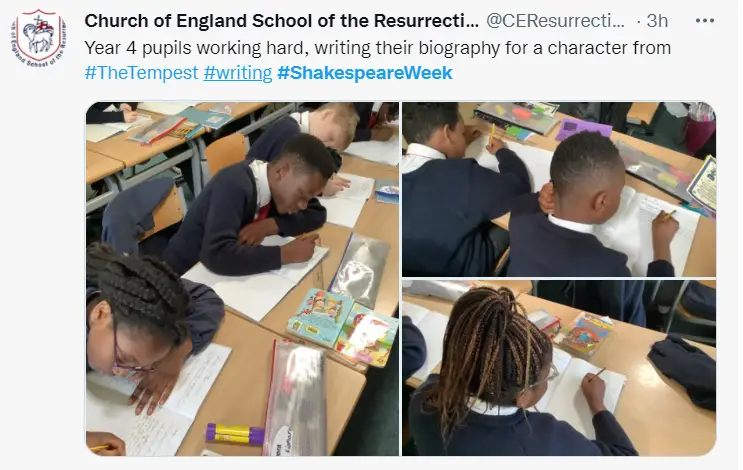On Monday 21st March, primary schools, families and libraries across the world celebrated the start of Shakespeare Week, designed to inspire young minds and encourage creativity in writing amongst those aged 10 years old and under. Here, we explore why this celebration of literature is so important, ways young people marked the occasion and how poetically this week pre-empts the imminent launch of the Government’s Schools White Paper.
The importance of Shakespeare today
Shakespeare may seem a historical icon viewed upon through the corridors of the past. Yet, celebrating his legacy is perhaps more important this year than any other in living memory.
Recent reports showed that a quarter of 11 year olds in the UK were already struggling to read in 2019, raising serious concerns about the impact of school closures and lockdowns on children’s literacy levels. What’s more, the National Literacy Trust recently revealed only 30.1 per cent of children read something daily in their free time. Worryingly, this number fell since 2021.
Occasions such as Shakespeare week offer families, schools and libraries the chance to inject creativity, fun and inspiration into literacy, to overcome the loss in learning many students have suffered. To achieve this, celebrations took some of the following forms:
Plays
Schools such as Moreton Hall and Maidstone brought Shakespeare and literature to life by organising Shakespearian plays, complete with costumes, set design, choreography and more! This brought students and families together, as many year groups were involved in the productions. Consequently, students gained an insight into the power of words and how to convey concepts and emotions through writing and with it, performing.


Shakespeare in 2022
Libraries across the country marked Shakespeare Week by paying homage to his presence in the 21st Century. Although many think Shakespeare died on 23rd April 1616, he is still very much alive today, in so much as he lives on through his legacy and the vocabulary that dominated popular culture.
For example, when was the last time you use one or more of the below phrases?
- Heart of gold
- So-so
- What’s done is done
- For goodness’ sake!
- Be all/end all
- The world is my oyster!
- Dead as a doornail
- Seen better days
- Break the ice
- Wild goose chase
- Full circle
- The naked trust
- Fight fire with fire
These are all thanks to William Shakespeare!
Libraries such as those in North Yorkshire shined a light on these phrases and terms which underpin our language and with it, tell a story about our history and linguistic heritage. This can help young learners make sense of the English language and how these phrases have risen to popularity and impacted public psyche.
Inspiring writing
Shakespeare of course has also inspired many students to put pen to paper. For example, children at Church of England Schools have been inspired to write biographies of Shakespearian characters, delving into their strengths, weaknesses, loves, fears and relationships with others.
Exercises like these give students an insight into the art of storytelling and building three dimensional characters, which are central literacy skills.

Women in Shakespearian England
While it is important to celebrate the work of Shakespeare during this awareness week in positive and creative ways, it is also important to offer students the chance to think critically.
Organisations such as the Poetry Foundation achieved this by shining a light in the gender dynamics which dominated the Shakespearian era. It did so by highlighting the female writers, such as Mary Sidney Herbert Countess of Pembroke, who were dismissed and side-lined, while male authors were praised and promoted.
This more critical celebration of Shakespeare helps expand children’s understanding of the progression of literature. It can help explain why only seven per cent of GCSE students study female authors, while giving students the tools to analyse history and literature critically.
Literature in education: Schools White Paper
Somewhat poetically, Shakespeare Week pre-empts the Government’s Schools White Paper, which we expect to be published next week. This Paper will be the first of its kind to be published since 2016. It will focus on literacy and will set out how the Government plans to tackle low reading rates and a loss in learning exacerbated by the pandemic.
In line with this, the Government recently promised to ensure 90 per cent of all primary school children in England achieve the expected standard in reading for their age by 2030. This number stands at 65 per cent today, however it is not yet clear how this number will be boosted on a tangible or practical level.
While some students continue to question ‘to be or not to be’, there is an even bigger question mark hanging over the fate of young people’s literacy in the UK, which should be addressed, if not answered, early next week.




